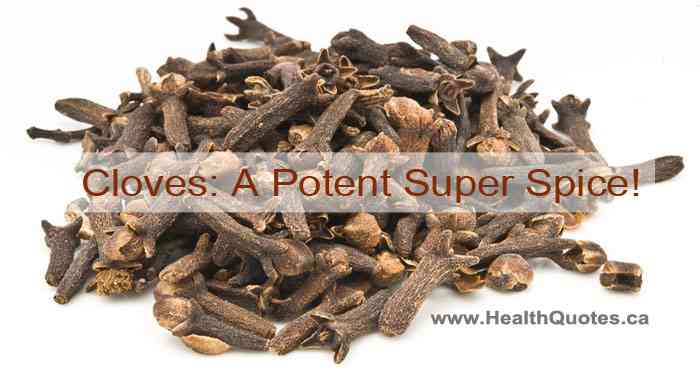Aromatic Cloves: A Super Spice
By Krista DeKuyper | May 24, 2017 |

Welcome to this 6th article of our “Healthy Spices” blog series. In this post we look at aromatic cloves, a healthy and medicinal spice that has been in use for thousands of years.
What are Cloves?
Cloves are actually the aromatic flower buds from the “clove” evergreen tree. The clove tree is a member off the Myrtaceae family, which also consists of the guava, allspice and eucalyptus trees.
Clove trees are tropical. They originated in Indonesia, and are now found in many equatorial countries such as India, Madagascar, Bangladesh, Pakistan, Brazil, the West Indies and Zanzibar.
Clove trees must be at least 5 years old in order to produce flowers.1 The buds are picked when they start to turn pink and are then dried out naturally.
Cloves are used in several different manners. They can be used as is, in which case they are often removed after cooking with them. Cloves are also available as either a powder (e.g. ground cloves), or as a potent essential oil (clove bud oil).
Historical Use of Cloves
The first recorded usage of cloves goes back as far as 1721 BC, which was the age a jar containing cloves was dated after being excavated by archaeologists on a dig in Syria.
Cloves were used extensively by the Chinese as far back as 200 BC, and it has been reported that people seeing the Emperor had to chew on cloves in order to approach the throne with nice, fresh breath! They were particularly popular during the reign of the Chinese Han Dynasty, which existed from 200 BC to 200 AD.
The ancient Romans also held cloves in high esteem, with Arab traders bringing them to Europe sometime around 335 AD. When the Roman Empire collapsed cloves virtually disappeared from Europe, until such time as they were re-introduced back into Europe by the Saracens (who conquered Sicily), the returning Crusaders and the Portuguese after making their way to India.
By the 13th century cloves had become very popular and expensive spice in Europe. In fact, cloves were one of several important spices that formed the basis of what is known as the spice trade. How expensive were they? Well, at that time cloves were actually worth more than their weight in gold! It is no wonder they were so sought after by explorers and merchants.
The Dutch found out about cloves in the 16th century, and did everything they could to maintain the clove monopoly by destroying every clove tree they found with the exception of those on one island in the Moluccas called “Amboina”, which they controlled. (This behavior caused quite a bit of resentment towards the Dutch from nearby peoples).
Eventually, this monopoly was broken in the 1700s when the French smuggled trees off of Amboina and took them back to Mauritius with them.
Today, cloves are used all over the world, with most of the cloves still being produced by Indonesia.
Nutritional Properties of Cloves
Cloves are high in many minerals such as potassium, iron, manganese, magnesium and selenium.
They are also a good source of vitamin A, vitamin K, vitamin B6, vitamin B1, vitamin C and beta-kerotene.
Medicinal Properties of Cloves
A big part of why cloves have been so popular for thousands of years are their amazing medicinal properties. Just some of these are:
- Anti-bacterial. Cloves are anti-bacterial (and anti-microbial). As such, diluted clove oil has been used to treat acne and other microbial conditions.
- Anti-fungal. Cloves have been found to be at least as effective as nystatin when it comes to treating candida as well as other fungal infections.2
- Dental anesthetic. Cloves contain significant amounts of “eugenol”, an anesthetic (as well as being antiseptic). As a result, clove oil has been used for centuries to alleviate dental pains resulting from toothaches.
- Anti-oxidant. Cloves are very powerful antioxidants, and are second only to raw sumac bran when it comes to natural antioxidant levels. As such they can help protect your cells against free radical damage, thereby reducing the various health effects of aging.
- Antiseptic. Cloves are antiseptic, and as such clove oil can help to prevent infection.
- Anti-inflammatory. Clove is an anti-inflammatory, and as such cloves can help to reduce inflammation.
Conditions that cloves have been used to treat3:
- Coughs and upper respiratory infections (cloves are an expectorant).
- Digestive aid.
- Oral diseases (e.g. gingivitis and periodontitis)
- Tooth aches.
- Diabetes control (cloves seem to reduce blood sugar levels, but more study is required).
- Bone preservation.
- Immune system boost.
- Headaches.
- Excessive gas and bloating (cloves have anti-flatulent properties).
- Arthritis and sore muscles (clove oil applied to the skin increases the blood flow, making the skin feel warm).
Cooking with Cloves
Aromatic Cloves are used in cooking in either a powdered form or as whole cloves. When used as whole cloves they are often removed before eating.
Cloves have a strong, sweet, taste, and can be used in a wide variety of dishes such as stews, sauces, meat flavouring, teas, and even desserts.
Cooking with aromatic cloves is especially popular in the Middle East, along with China and other Asian countries.
When cooking with cloves the only limit is your imagination!
Click here for lots of clove recipe ideas via All Recipes.
Cautionary Notes
The following are things you should be aware of when using cloves (especially when taking large amounts via clove bud essential oil):
- Cloves can interact with anticoagulant and antiplatelet drugs since the eugenol it contains slows down blood clotting.
- For the same reason above, do not ingest large amounts of clove oil a day or two before having surgery.
- Undiluted clove essential oil is very potent. If not diluted it can cause burning and tissue damage when applied directly to the skin.
- Clove cigarettes called “kreteks” may be worse for human health compared to cigarettes made from tobacco.
Conclusion
We hope you enjoyed this “super spices” blog article about cloves.
Super spices such as cloves not only add flavor to our food, they also help to prevent disease via their potent nutritional and medicinal properties!
Sources:






























